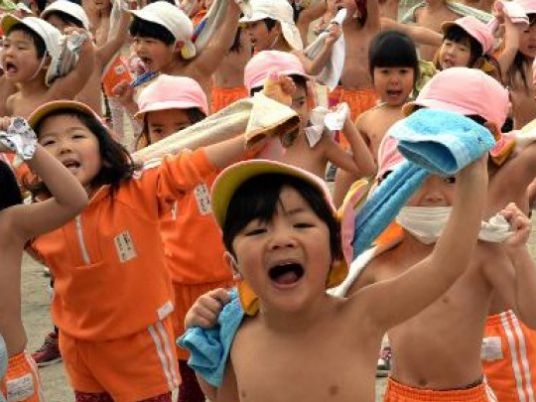
The sound of children playing can no longer be considered noise pollution in Tokyo, as Japanese authorities try to remove legal barriers to building childcare centres and help parents get back to work.
A local law designed to prevent noise over 45 decibels in residential areas of the capital — which forced some kindergartens to use sound baffling and occasionally prevent youngsters from playing outside — was changed on Wednesday to exclude children's voices.
"The ordinance was originally aimed at preventing pollution and environmental destruction, so we have revised only a small part of it to exclude the voices of young children and their caregivers," Tokyo official Hideka Kimura told AFP.
"We hope this revision will support efforts by childcare givers, but we're aware that it won't address the problem in its entirety because, for some people, the sound of dozens of children playing still counts as 'noise'," he added.
Until Wednesday, neighbours' complaints about excessive sound coming from nurseries and daycare centres were routinely upheld, and planning permission could be refused for any project deemed likely to result in disturbance.
In 2012, a lawsuit was filed seeking an injunction against the construction of a new childcare centre in Tokyo, while there have been dozens of cases where residents complained about excessive noise from children playing, a Tokyo government survey found last year.
In the residential district of Setagaya, nearly 20 percent of applications to build new childcare centres were delayed following complaints by residents, the mayor told local media.
The problem is exacerbating an already-dire shortage of facilities for young children throughout Japan, hampering efforts to tempt the country's well-qualified but under-employed women back into the workforce.
About 43,000 children are waiting for vacancies in nursery schools in Japan, 12,000 of them in Tokyo alone, the labour ministry says.
"Successful organisations tell us the key to resolving conflicts with neighbours is communication, for example inviting them to school and kindergarten events and jointly holding community festivals," said Kimura.
This helps nurture a sense that children belong to and should be raised by the whole community, he explained.
Already, a quarter of Japan's population of 127 million are aged 65 or over. With little in the way of immigration and a very low birthrate, that proportion is forecast to rise to 40 percent over the coming decades.
That is creating shortages in the labour market and piling pressure on an already-strained social welfare system in which fewer workers are supporting ever-more pensioners.
A lack of childcare not only prevents mothers from returning to their jobs to bulk up the workforce, but also plays a part in dissuading them from having more children, thus worsening both problems.
Experts note that the issue is self-perpetuating because an ageing and declining population becomes less tolerant of children as it is exposed to fewer of them.




